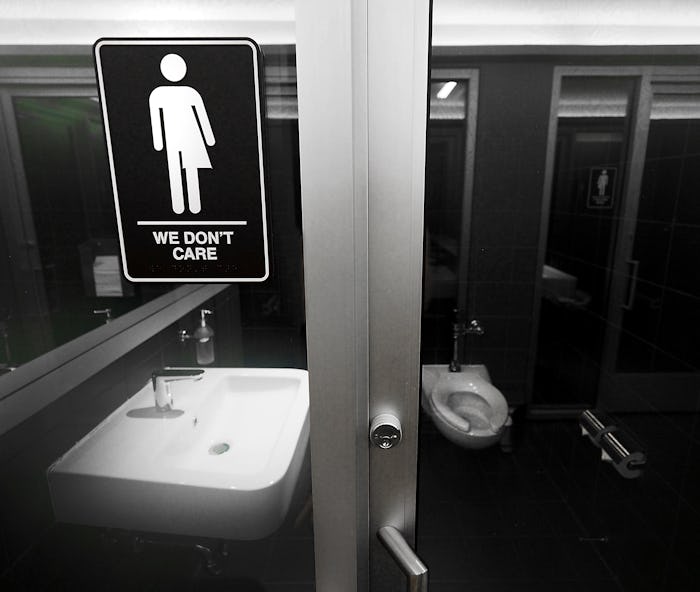News

What Are State Laws On Transgender Students Using Bathrooms Of Their Identification?
It can be baffling to realize that the idea of people using the bathroom that corresponds with their gender identity could actually be a hot-button political issue in 2016, but unfortunately it is — so much so that the Obama Administration had to issue a directive Friday reminding states and school districts that barring students from using certain bathrooms is discriminatory, according the New York Times. While the directive is not legally enforceable, it does clarify exactly what the White House's position is on state anti-discrimination laws is — that is, that schools have an obligation “to provide transgender students equal access to educational programs and activities," and that doing otherwise is against the law (not to mention completely unfair and backwards). What are current state laws on transgender students using bathrooms of their identification? While certainly not all states seem to need this important reminder, there is a wide range of legal policies at the state level governing how LGBTQ people are treated.
According to the Transgender Law Center's equality map, only 12 states (plus the District of Columbia) have laws in place at the state level prohibiting discrimination in schools based on sexual orientation or gender identity. A small number of states have related laws or policies that prohibit discrimination based only on sexual orientation (not gender identity), but the majority of U.S. states — 33 to be exact — currently do not have any laws in place to protect LGBTQ students.
According to CNN, the letter, which was authorized by both the Department of Education and the Department of Justice, explains that, according to federal civil rights law Title IX, public schools are not legally allowed to discriminate against trans students. The law, outlined on the U.S. Department of Education's website, states:
No person in the United States shall, on the basis of sex, be excluded from participation in, be denied the benefits of, or be subjected to discrimination under any education program or activity receiving Federal financial assistance.
So why are some states, like North Carolina, arguing that they have the right to bar transgender students from using certain bathrooms? As with many legal issues, it comes down to interpretation. While the White House is clearly interpreting Title IX to apply to transgender students, the law, as it is currently written, doesn't specify that discrimination based on gender identity counts as discrimination "on the basis of sex." And that legal gray area means that, despite Title IX, state-level anti-LGBTQ laws like North Carolina's House Bill 2 could be considered perfectly legal.
According to Vox, the Department of Justice and the state of North Carolina are currently embroiled in a legal battle over this definition, and obviously a lot is at stake. After all, if it is determined that Title IX does include protection on the basis of gender identity after all, then any school receiving public funding would be required to follow it. If not, then states are free — at least for the time being — to allow schools to bar transgender students from using the bathroom (or locker room, or whatever else) of the gender with which they identify.
But even without the ability to be legally enforced, President Obama's announcement is still a major deal. According to the Associated Press, Attorney General Loretta Lynch said the letter sends a very clear message about schools' responsibility to protect all students from discrimination:
There is no room in our schools for discrimination of any kind, including discrimination against transgender students on the basis of their sex. This guidance gives administrators, teachers and parents the tools they need to protect transgender students from peer harassment and to identify and address unjust school policies.
Education Secretary John B. King also agreed, emphasizing in a statement the important of inclusion:
We must ensure that our young people know that whoever they are or wherever they come from, they have the opportunity to get a great education in an environment free from discrimination, harassment and violence.
While there is still no way to ensure that states actually follow these rules, the hope is that the added push from the White House to keep all students safe regardless of who they are will make a difference. It's painfully clear though that, despite all the progress made for LGBTQ rights in this country, there is still so much more work to do.